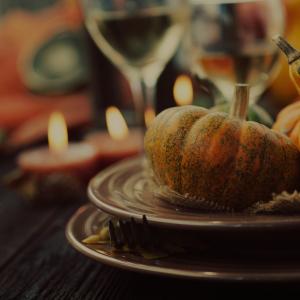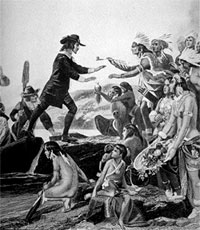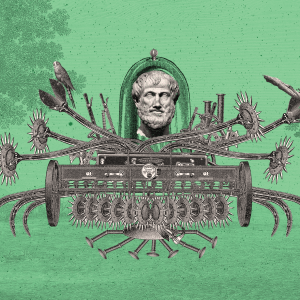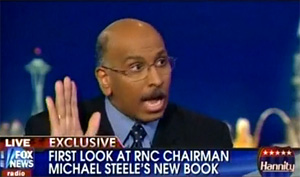
Dr. Randy Woodley is author of Shalom and the Community of Creation: An Indigenous Vision (Eerdmans); his podcast, Peacing It All Together, can be found at peacingitalltogether.com. Dr. Woodley and his wife, Edith, operate Eloheh Indigenous Center for Earth Justice and Eloheh farm near Portland, Ore., where he is distinguished professor of faith and culture at Portland Seminary. After losing their farm to a paramilitary white supremacist group, the Woodleys are currently raising funds for a new Indigenous learning center (patreon.com/randywoodley).
Posts By This Author
White Supremacy and the Fate of the Earth
CHANGE IS DIFFICULT, great change even more so. Yet some things change naturally over time with seemingly little effort—the course of a river, the shore of an ocean, the direction a tree decides to grow. When humans interfere with the course of nature in an unnatural and thoughtless manner—such as by damming a river or clear-cutting a forest—we are bound to experience unknown and often unwanted consequences. But perhaps reverting to more natural systems of change will not be as difficult as we imagine.
Western civilization is just beginning to realize that nature is wiser and more powerful than we are and will, without a doubt, outlive us. She knows her mind, and she understands what keeps life in balance. Because today we seldom see nature in her unmolested glory, we rarely consider the degree to which Western civilization has changed that which is natural to what is now unnatural. Since time immemorial, Indigenous people have learned to observe natural change and tried to flow with it, or bend it to their benefit.
Now, like never before, we need people with keen observational skills to help us recover and retain the truths in nature. Indigenous wisdom’s long relationship with creation is based on an ethic of harmony, humility, and respect. Such efforts need not always contradict Western notions of science. Modern scientific methods often confirm the truths that our Indigenous teachers have always known. Science verifies what scientists observe. In more than one sense, our Indigenous elders have always been scientifically aware. Western scientists use tools that tell them the hydrological cycles have changed. Our elders know the huckleberries are ripening a month later than they always have. I have heard from elders in the past few years that our medicine plants are not nearly as potent as they used to be. They say the earth is weakening; an unnatural change has occurred. Western science has come to the same realization by explaining that as more carbon is released into the atmosphere, plants are less able to develop the nutrients needed. Both observe verifiable knowledge. But one is abstract while the other is personal. What modern science tells Western society about creation, our Indigenous “scientists” have been observing for millennia. What we can agree upon together is that the earth is changing, unnaturally, and it is not a good change.
The Fullness Thereof
CHANGE YOUR LENSES, please. Okay, maybe you can’t simply change lenses right now, but would you at least notice the lenses you are currently wearing? If you are like, say, 99.9 percent of us in the U.S., you have been influenced by a very particular set of perspectives that interpret life from an Enlightenment-bound Western worldview.
All of our lenses have various perspectival tints, but Western worldviews seem to have several in common, including the foundational influence of Platonic dualism, inherited from the Greeks. This particular influence absolutizes the realm of the abstract (spirit, soul, mind) and reduces the importance of the concrete realm (earth, body, material), disengaging them from one another. In dualistic thinking, we are no longer an existing whole.
Western worldviews tend to have other related assumptions—such as hierarchy, extrinsic categorization, individualism, patriarchy, utopianism, racism, triumphalism, religious intolerance, greed, and anthropocentrism. But the influence of dualism empowers these other concerns.
What difference would it make if life were viewed instead as a fundamental whole, if the earth itself were seen as spiritual? And how would such a worldview square with Jesus’ approach to such matters?
Why I Vote
A Deeply Moral Act
Voting is a decisive statement of Christian faith that I matter, justice matters, and others matter.
by Richard Rohr
Low voter turnout is generally a sign of a demoralized society, and people of power feed on that demoralization, knowing that they can then easily gerrymander, suppress and limit voting rights, and give elections to the rule of money and lobbyists—and there will be little outcry, because there is so little trust or even interest in the whole system anyway.
Yet this is largely where the U.S. is today.
The powers that control society are quite happy that it is always minorities of all stripes that first feel this powerlessness and this demoralization. Since the early days of representative government, it has been believed that democracy would only work if there was a truly free and informed citizenry. We presently seem to lack both in the U.S. This is why voting is a deeply moral act for me—in rebuilding confidence and encouraging an intelligent and hope-filled society. It is also a decisive act of Christian faith that I matter, society matters, justice matters, and others matter.
Not to vote is to hand our power and our dignity over to people who fear actual freedom, honest intelligence, and faith in the very goodness of humanity.
Voting for Change
I vote because many of my brothers and sisters can’t.
by Myrna Pérez
I vote for a lot of reasons. I love joining my fellow citizens in a community-minded act. I love having a say in picking the leaders who get to decide on things that matter to me. Increasingly, I love to vote and feel compelled to vote because I know there are about 4.5 million Americans living and working in communities across the country who cannot because they have a criminal conviction in their past.
How You Can Honor Both Sides of the Thanksgiving Table

Image via mythja/Shutterstock.com
When we think about the meeting of the first pilgrims and the Native Americans, we usually connect vicariously to one side of that old Plymouth encounter, mysteriously linking our faith journey to the early pilgrims’ faith journey. But what about those long-ago Native Americans? Is there a reason to remember them as more than a foil for the pilgrims?
Year after year we think warmly of that first union of the pilgrims and the Native Americans — and then we continue on in the supposed faith tradition of one of those peoples without another thought to the fate of the others.
So what role do those old Native Americans play in our faith today, and how might we bring them to mind or honor them? Here are a few ways you can faithfully honor both sides of the Thanksgiving table this year.
Americans Lost Freedom in Iraq: D
We Must Ask Moral Questions About Our Oil Addiction (Part II)
We Must Ask Moral Questions About Our Oil Addiction (Part I)
Michael Steele and Racially Insensitive or Racist Comments
Remembering Native Americans -- Beyond November
Why Celebrate Columbus Day?

Photo via Gurgen Bakhshetsyan / Shutterstock.com
As an explorer, Columbus was not the first to reach the Western Hemisphere. Native Americans had been here for 10,000-20,000 years, and Vikings and Chinese are among those others who hold prior claims. Even after four attempts, Columbus never realized his goal of finding a western ocean route to Asia. As a “founding father type figure” he never set foot in what is now considered America but landed in the present day Bahamas, Cuba, and Haiti.
As a Christian example he enacted terrible cruelties to friendly natives: assuming unlawful rights of authority; robbing and subjugating whole nations of their freedom and entire capital; allowing his men to rape, murder and pillage at will; and deliberately leading the way for the genocide of millions, considered by many to be the worst demographic catastrophe in recorded history.
So why do Americans celebrate Columbus Day?
Bombing the Moon? Really?
Ken Burns' National Parks: An Unnatural Wilderness
Might Will Never Make Right In Afghanistan
Creating a New American Ethos
A Public Prayer of Thanksgiving
How the Big Three Automakers Could Test Better Health Care
A Great Bedtime Story
A Look at Mary in August
My wife and I are starting the book of Luke for our devotional reading this week. The whole Christmas story comes up so fast, and it is a bit strange to consider the story in August. We talked about the extreme categorization of the Western church and how certain stories are usually told only at one time of the year. Well, not so now.
We thought if we can separate ourselves from the "assigned category" of Christmas and hear the story as a story -- not just as the propositional truth we are [...]
Who's Not Ready for Minority Leadership?
A pastor of a large metropolitan church once sought me out for some advice. He was told by several other people that as far as solving his church growth dilemma, namely, drawing Native Americans to the church, I was the "go to guy." Disregarding whether or not those assumptions were correct, I agreed to have a meeting with him over breakfast the next day. He began our meeting by laying out his failures in attracting a significant First Nations crowd, even though the neighborhood demographics [...]
Who's the Illegal Immigrant, Pilgrim?
 There seems to be much concern lately over the people being referred to as "illegal immigrants." Let's define our terms: "Immigrant" - somebody who has come to a country and settled there. "Illegal" - forbidden by law. Concern about illegal immigrants has a familiar ring to us Native Americans. We have been empathizing with those concerns for over half a millennium.
There seems to be much concern lately over the people being referred to as "illegal immigrants." Let's define our terms: "Immigrant" - somebody who has come to a country and settled there. "Illegal" - forbidden by law. Concern about illegal immigrants has a familiar ring to us Native Americans. We have been empathizing with those concerns for over half a millennium.
Let's see ...Were the [...]



